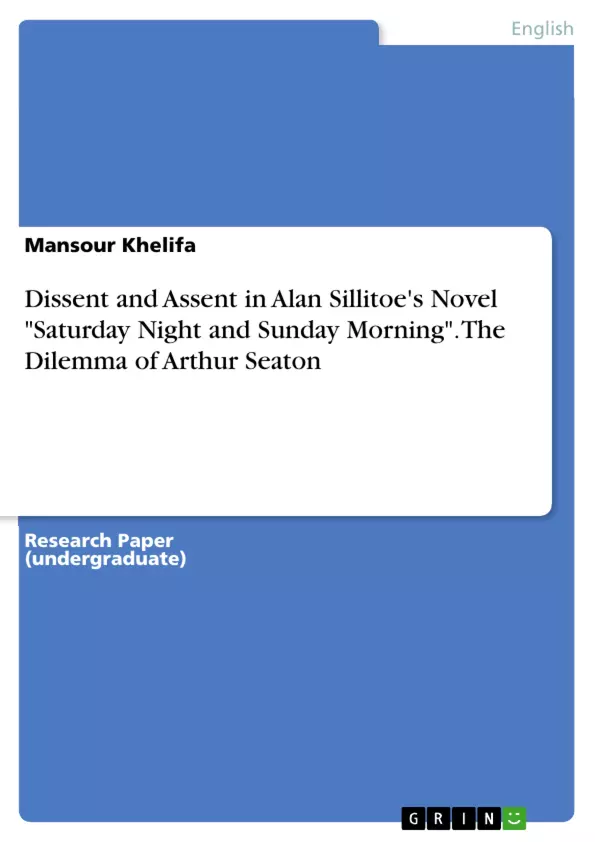The sweeping assertion “once a rebel, always a rebel,” soliloquised by Alan Sillitoe’s character Arthur Seaton in "Saturday Night and Sunday Morning", published in 1958, echoes the dissent of the Angry Young Men of the late fifties and sixties in Britain and functions as a binding theme and narrative strategy yoking together the different fragments of the novel.
The purpose of this paper is to study the various aspects of the anti-hero’s dissenting action, assess the limits of his rebellion and eventually relate the complexity of the narrative to a larger corpus of literature that is more likely to be dubbed “literature of dissent” rather than “literature of exhaustion” (John Barth 70 – 83); although Sillitoe’s novel may partake of both. Such subversive trends, typical of post-war British literature, permeate a wide spectrum of working-class ethics ranging from mere industrial dissent to more life-enhancing assent.
The ultimate purpose of such literary representation of modern life in Britain is to question, at the same time, the bourgeois standards of profitability and the controversial identity of the marginally subversive working-class anti-hero trapped between hope and despair, revolt and submission.
Inhaltsverzeichnis (Table of Contents)
- Dissenting anti-heroes
- Anger and dissent in SNSM
- Industrial dissent:
- Political dissent:
- The poetics of dissent in SNSM.
Zielsetzung und Themenschwerpunkte (Objectives and Key Themes)
This paper aims to analyze the dissenting actions of the anti-hero Arthur Seaton in Alan Sillitoe's "Saturday Night and Sunday Morning". It examines the limits of his rebellion and explores the relationship between his narrative and a wider body of "literature of dissent". The paper seeks to understand the role of dissent in representing modern working-class life in post-war Britain.
- The nature and limits of Arthur Seaton's dissent
- The role of industrial and political dissent in the novel
- The representation of working-class life and ethics in post-war Britain
- The ambiguous identity of the anti-hero trapped between hope and despair
- The connection between Sillitoe's work and the broader "literature of dissent"
Zusammenfassung der Kapitel (Chapter Summaries)
- Dissenting anti-heroes: This chapter explores the prevalence of dissenting heroes and anti-heroes throughout history and literature, from Greek mythology to contemporary literature. It highlights examples of rebellion against authority and established values, including the "Oedipal revolt" as an archetypal act of dissent.
- Anger and dissent in SNSM: This section introduces Arthur Seaton, the protagonist of the novel, and his initial act of dissent through a beer-drinking challenge. It depicts his confrontational and defiant attitude towards authority figures and social norms.
- Industrial dissent: This chapter focuses on Arthur's experiences in the factory, highlighting his frustration with the dehumanizing work environment and the pressure to maintain a specific production rate. It explores his resentment towards the "gaffer" and his fantasies of blowing up the factory as a form of rebellion.
Schlüsselwörter (Keywords)
The paper examines the themes of dissent, rebellion, working-class identity, post-war Britain, anti-hero, alienation, industrialisation, and the "literature of dissent". It explores the perspectives of authors like Alan Sillitoe, John Osborne, Harold Pinter, and George Orwell.
Frequently Asked Questions
Who is Arthur Seaton in "Saturday Night and Sunday Morning"?
Arthur Seaton is the anti-hero of Alan Sillitoe's 1958 novel, representing the "Angry Young Men" of post-war Britain. He is a working-class rebel trapped between industrial routine and personal revolt.
What are the main themes of the novel?
Key themes include dissent, rebellion against authority, working-class ethics, alienation in the workplace, and the struggle for identity in a consumerist society.
What does "industrial dissent" mean in the context of this book?
It refers to Arthur's resentment towards the dehumanizing environment of the factory, his hatred for the "gaffer" (boss), and his attempts to sabotage the production pace to maintain some sense of autonomy.
What is the significance of the quote "once a rebel, always a rebel"?
This quote echoes the spirit of the late fifties in Britain, serving as a binding theme for the narrative and highlighting the protagonist's persistent defiance against social norms.
How does the novel relate to the "literature of dissent"?
The paper argues that Sillitoe's work is part of a subversive trend in post-war literature that questions bourgeois standards of profitability and explores the marginalization of the working class.
- Citation du texte
- Mansour Khelifa (Auteur), 2006, Dissent and Assent in Alan Sillitoe's Novel "Saturday Night and Sunday Morning". The Dilemma of Arthur Seaton, Munich, GRIN Verlag, https://www.grin.com/document/314249



